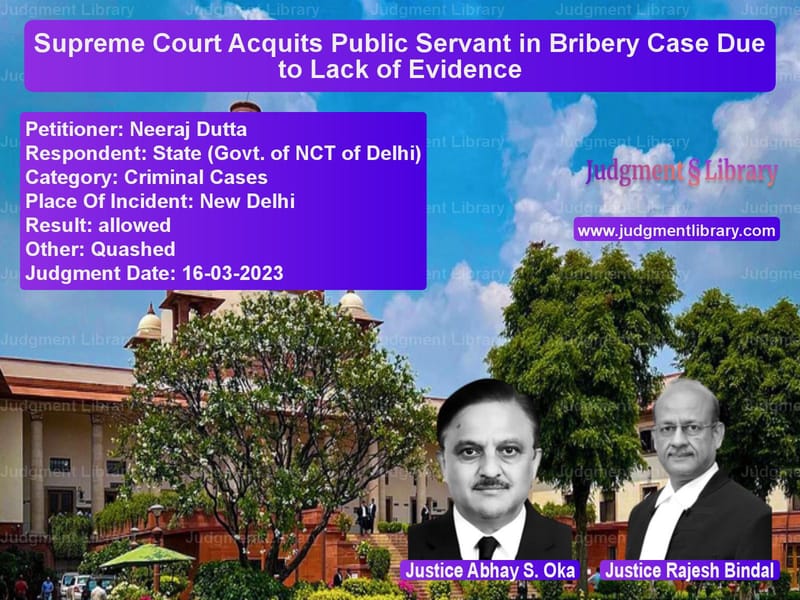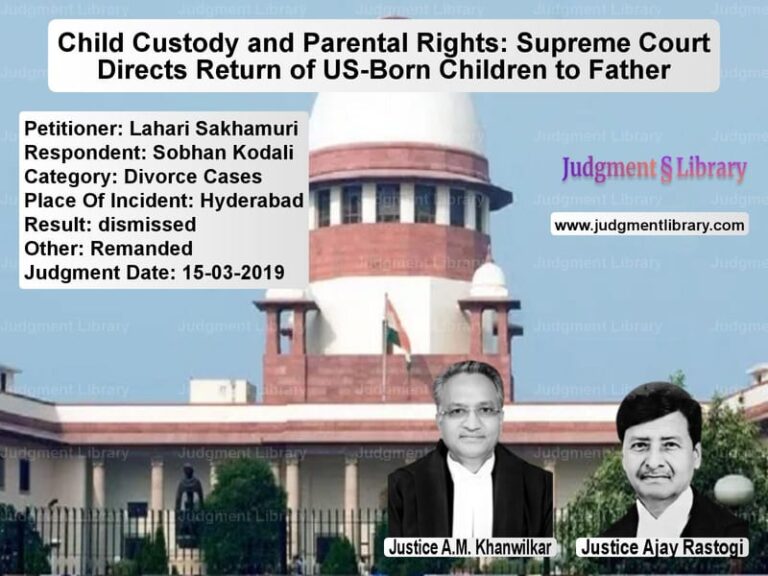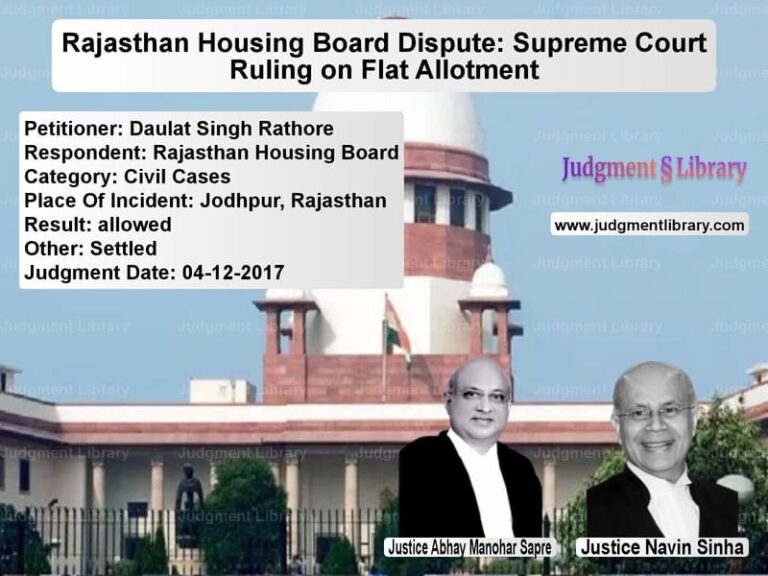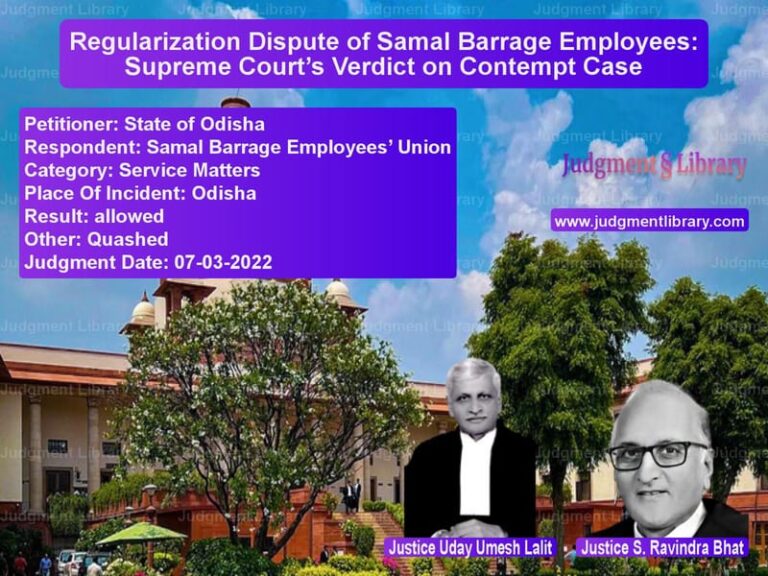Supreme Court Acquits Public Servant in Bribery Case Due to Lack of Evidence
The Supreme Court of India has set aside the conviction of Neeraj Dutta, who was accused of demanding and accepting a bribe in exchange for installing an electricity meter. The Court held that the prosecution failed to prove the essential ingredients of the offence under Sections 7 and 13 of the Prevention of Corruption Act, 1988, beyond a reasonable doubt.
Background of the Case
Neeraj Dutta, an inspector in the Delhi Vidyut Board (DVB), was convicted by the Special Judge, Delhi, for the offences under Section 7 and clauses (i) and (ii) of Section 13(1)(d) read with Section 13(2) of the Prevention of Corruption Act, 1988. She was sentenced to rigorous imprisonment for three years and fined ₹15,000 under Section 13(2). Additionally, she was sentenced to two years of rigorous imprisonment and fined ₹5,000 under Section 7.
The prosecution alleged that Neeraj Dutta demanded ₹10,000 from the complainant, Ravijit Singh, to install an electricity meter. A trap was set up by the Anti-Corruption Bureau (ACB), and she was arrested upon receiving the money. The complainant, however, was murdered before the trial commenced. The High Court upheld her conviction, following which she appealed to the Supreme Court.
Arguments by the Appellant (Neeraj Dutta)
- The appellant contended that there was no direct evidence of her demanding a bribe.
- The complainant, who was the primary witness, had passed away, and his testimony was not available.
- The conviction was based entirely on circumstantial evidence, which was insufficient to prove guilt beyond a reasonable doubt.
- The money allegedly recovered was not conclusively proven to have been received as a bribe.
Arguments by the Respondent (State of NCT of Delhi)
- The prosecution argued that demand and acceptance of the bribe could be inferred from circumstantial evidence.
- Shadow witness PW-5 confirmed that the appellant asked for documents and ₹10,000.
- Once illegal gratification is proved to be received, a presumption arises under Section 20 of the Prevention of Corruption Act that it was accepted as a bribe.
- The appellant failed to provide a satisfactory explanation for receiving the money.
Supreme Court’s Observations and Ruling
The Supreme Court analyzed the legal requirements for proving bribery and held that:
- The demand and acceptance of gratification must be proved beyond a reasonable doubt.
- Mere possession of tainted money is not enough to convict a person under the Prevention of Corruption Act.
- In the absence of direct testimony from the complainant, the prosecution must prove demand through reliable circumstantial evidence.
- The evidence presented by the prosecution, including the testimony of PW-5, did not conclusively establish demand and acceptance.
The Court emphasized:
“The demand for gratification and its acceptance must be proved beyond a reasonable doubt. Mere recovery of tainted money is not sufficient.”
Final Judgment
The Supreme Court set aside the conviction and ruled:
- The prosecution failed to prove the demand for and acceptance of illegal gratification.
- The conviction and sentence imposed by the Special Judge and upheld by the High Court are quashed.
- The appellant is acquitted of all charges.
- Her bail bonds stand cancelled.
Implications of the Judgment
This ruling has several key implications:
- Higher Standard of Proof: Reinforces that demand and acceptance must be proved beyond doubt, not merely inferred.
- Presumption Under Section 20: Clarifies that the presumption of guilt under the Prevention of Corruption Act applies only when demand is conclusively established.
- Protection Against Unfounded Prosecution: Ensures that public servants are not wrongfully convicted based on weak or circumstantial evidence.
- Judicial Precedent: Establishes that courts must be cautious while convicting under anti-corruption laws and ensure fairness in cases where complainants are unavailable.
Conclusion
The Supreme Court’s decision in Neeraj Dutta vs. State (Govt. of NCT of Delhi) underscores the principle that proof of demand and acceptance of a bribe is crucial for a conviction under the Prevention of Corruption Act. The ruling ensures fairness in corruption trials and protects individuals from being convicted based on mere presumptions. It serves as an important precedent for future corruption cases, reinforcing the necessity of direct and credible evidence.
Read also: https://judgmentlibrary.com/supreme-court-acquits-murder-convict-pradeep-kumar-freed-after-19-years/
Petitioner Name: Neeraj Dutta.Respondent Name: State (Govt. of NCT of Delhi).Judgment By: Justice Abhay S. Oka, Justice Rajesh Bindal.Place Of Incident: New Delhi.Judgment Date: 16-03-2023.
Don’t miss out on the full details! Download the complete judgment in PDF format below and gain valuable insights instantly!
Download Judgment: neeraj-dutta-vs-state-(govt.-of-nct-supreme-court-of-india-judgment-dated-16-03-2023.pdf
Directly Download Judgment: Directly download this Judgment
See all petitions in Fraud and Forgery
See all petitions in Custodial Deaths and Police Misconduct
See all petitions in Judgment by Abhay S. Oka
See all petitions in Judgment by Rajesh Bindal
See all petitions in allowed
See all petitions in Quashed
See all petitions in supreme court of India judgments March 2023
See all petitions in 2023 judgments
See all posts in Criminal Cases Category
See all allowed petitions in Criminal Cases Category
See all Dismissed petitions in Criminal Cases Category
See all partially allowed petitions in Criminal Cases Category







